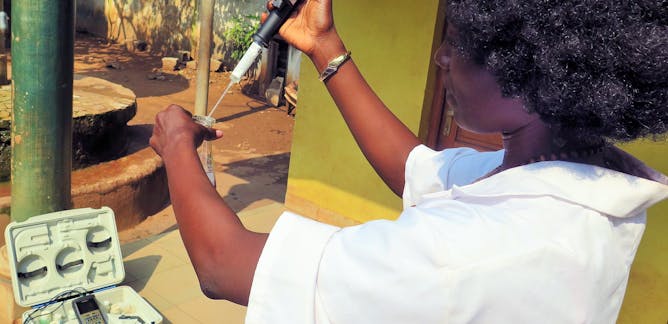|
Today the world marks the International Day of Women and Girls in Science. Over the past 15 years, more and more women and girls have been drawn into careers in science, technology, engineering and maths (STEM), among other disciplines. But much remains to be done to close the still large gender gap.
Ntombizikhona Beaulah Ndlovu, Amanda Weltman, Amélie Beaudet, Judith Koskey, Marilyn Ronoh, Melisa Achoko Allela and Mercy Muendo tell us about their experiences as women in STEM, and what advice they have for those who want to follow in their footsteps.
In Kenya, Wandiri Mbirianjau found that institutional and socio-cultural barriers contributed to women students’ poor performance in STEM degrees. And Amanda Gouws argues that it’s time to do
away with outdated thinking that suggests women engineers can’t measure up to their male counterparts.
Meanwhile, Ndoni Mcunu looks at how black women wishing to enter “non-traditional” careers face opposition from patriarchal African cultures. And Bernard Slippers and Smeetha Singh argue that
institutions and organisations must offer truly inclusive programmes for young mothers and an opportunity for more women to remain in science in Africa.
|

More must be done to draw women into STEM careers.
Burlingham/Shutterstock
Ntombizikhona Beaulah Ndlovu, iThemba LABS; Amanda Weltman, University of Cape Town; Amélie Beaudet, University of the Witwatersrand; Judith Koskey, Egerton University; Marilyn Ronoh, University of Nairobi; Melisa Achoko Allela, Technical University of Kenya; Mercy Muendo, Daystar University
Women are drastically under-represented in the science, technology, engineering and maths fields.
|
Women in STEM
|

Lucy Wandiri Mbirianjau, Kenyatta University
Gender biases are revealed in enrolment inequalities and policies that favour male students.
| |

Bernard Slippers, University of Pretoria; Smeetha Singh
Not much attention has been given to how mothers who want to attend workshops and conferences are supported. This simple intervention can boost the presence of women in science.
|

Amanda Gouws, Stellenbosch University
Under representation of women in the science and engineering career fields is a result of poor work life balance.
| |

Ndoni Mcunu, University of the Witwatersrand
Family, marriage and culture are among the factors that influence black women's experiences as scientists.
|
|
|